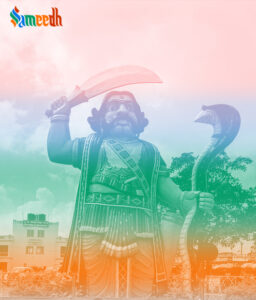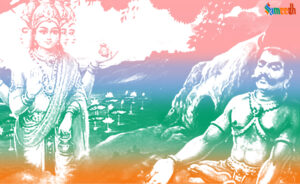Mahishasura is a Sanskrit word composed of Mahisha meaning “buffalo” and asura meaning “demon”, translating to “Buffalo Demon”. Mahishasura had gained the boon that no man could kill him.

Mahishasura was a powerful demon in Hindu mythology who is known for his battle with the goddess Durga. The story of Mahishasura and the granting of the boon is as follows:
- Mahishasura was a formidable demon who had the ability to change shape from human to buffalo at will.
- He was known for his great strength and arrogance, and he used his power to wreak havoc and conquer both the heavens and the Earth.
Why Mahishasura was granted a boon:
- Mahishasura was a devout devotee of Lord Brahma, one of the members of the Hindu trinity (Brahma, Vishnu, and Shiva).
- His devotion and penance were so extreme that they pleased Lord Brahma.
What boon Mahishasura requested:
- Mahishasura requested a boon from Lord Brahma that he believed would make him invincible. He asked for the following specific terms:
- He should not be defeated by any god or man.
- He should not be slain by any weapon.
- He should not be killed on the land, in the air, or in the water.

By whom the boon was granted:
- Lord Brahma, impressed by Mahishasura’s devotion and penance, granted him the requested boon with these terms.
The granting of this boon by Lord Brahma made Mahishasura nearly invulnerable and led to his reign of terror. However, the gods, seeing the chaos he was causing, created the goddess Durga, who ultimately defeated Mahishasura in a fierce battle during Navratri. The story of Mahishasura symbolizes the triumph of good over evil and the power of the divine feminine, and it is a central theme of the Navratri festival.
